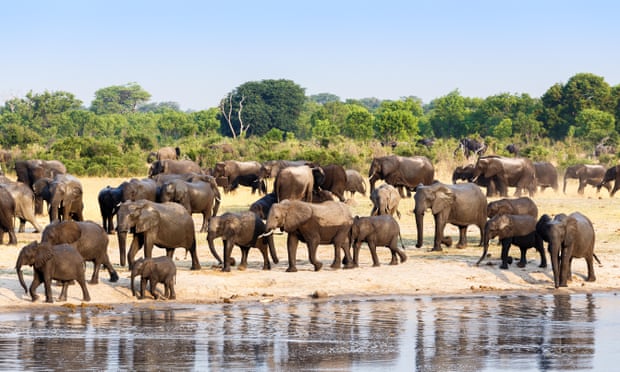More African elephants are being killed for ivory than are being
born, despite poaching levels falling for the fourth year in a row in 2015.
The new data, released on
UN world wildlife day on
Thursday, shows about 60% of elephant deaths are at the hands of poachers,
meaning the overall population is most likely to be falling.
“African elephant
populations continue to face an immediate threat
to their survival, especially in central and West Africa where high
levels of poaching are still evident,” said John Scanlon, secretary-general of
the Convention on the Trade in Endangered Species (Cites), which collects the data. At least 20,00o
elephants were killed for ivory
in 2015.
But Scanlon said there were
some encouraging signs, including in parts of eastern Africa, such as in Kenya,
where the poaching trend has declined.
“This is showing us all what is possible through a sustained and
collective effort with strong political support,” he said.
“The momentum
generated over the past few years is translating into deeper and stronger
efforts to fight these crimes on the front line, where it is needed most – from
the rangers in the field, to police and customs at ports and across illicit
markets.”
Elephant poaching peaked in
2011, when it accounted for about 75% of all deaths. Poaching has gradually
reduced since then but remains well above sustainable levels. Scanlon said even
greater efforts were needed to fully reverse the trend.
The new report revealed that a “troubling” upward trend in
elephant poaching was observed in the Kruger national park in South Africa for
the first time in 2015. The proportion of elephants killed by poaching jumped
from 17% in 2014 to 41% last year.
“While [this] is still below the
sustainability threshold, the substantial increase in what had been one of the
most secure sites for elephants in Africa is a cause for concern,” said the
report.
In January, poachers shot
down a helicopter in Tanzania and killed its British pilot during an operation to track down
elephant killers, while, in October last year, 14 elephants were poisoned by cyanide in
Zimbabwe.
As well as action to toughen
law enforcement and increase the penalties for wildlife crime, publicity
campaigns have attempted to deter people from buying illegal wildlife products.
In October, just before China’s president visited the UK, Prince William told
Chinese citizens to stop buying illegally traded wildlife products.
Other
campaigns have featured sports stars including Andy Murray, Rahul Dravid,
Francois Pienaar and Yao Ming.
